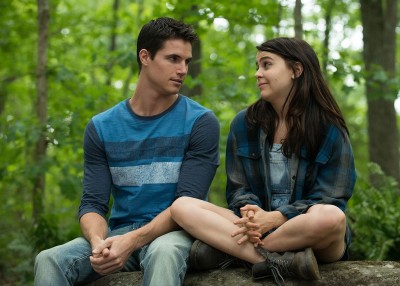
Teen movies have been telling us the same thing for decades: high school is hard. Not so much academically, though. Since the early ‘80s, teen movies have been America’s window into the twisty, painful particulars of adolescent social life. John Hughes and his kin have dedicated more than 30 years of celluloid to the arbitrarily determined hierarchies and strangely sanctified rituals of high school, attempting to create both camaraderie over and conversation about the struggles of the formative years. The latest film continuing this tradition is first-time director Ari Sandel’s “The DUFF,” based on the young adult novel by Kody Keplinger, and, well, at least it means well.
“The DUFF” centers on misfit Bianca (Mae Whitman), as she discovers from her popular jock neighbor Wesley (Robbie Amell) that she is the “Designated Ugly Fat Friend” (“DUFF”) of her tight-knit social circle. She is their less-attractive “gatekeeper,” kept around to make the others look good and filter out would-be suitors.
Bianca has all the classic markings of an “alternative movie teen” of old: she likes overalls, zombie movies and never goes to school dances. Once her shell-cracking arc begins to gain momentum, she enlists Wesley’s help to increase her confidence to ask out a musician she’s been eyeing (Nick Eversman). Standing in her way, though, is Madison (Bella Thorne), Wesley’s ex-girlfriend and their suburban high school’s resident mean girl, who spews quality zingers like “That’s what sucking at life looks like.” As far as witty takedowns go, “Mean Girls” this is not.
(This makes all the more criminal the film’s underutilization of Allison Janney as Bianca’s trite, self-help author mom. She’s in about four scenes and is thrown a grand total of two or three laughs).
Keplinger wrote “The DUFF” when she was just 17, so she was not afforded the perspective that many have when they’re writing about high school. By the same token, her age lent her the opportunity to write about high school as it happened to her, giving her a shot at a level of raw clarity unusual in the young adult genre. She wrote a book about body image issues teenage girls face when she was one, weaving in musings on friendships and home life and the gamut. Whatever clear-eyedness this story may have had on the page, though, is largely missing in Sandel’s adaptation.
From its opening moments, “The DUFF” is airless. It is aggressively modern to the point of being self-congratulatory, like your mid-western aunt who understands Vine and needs you to know about it. In a thoroughly depressing touch, Sandel includes the Instagram and Twitter handles of the film’s main cast in the closing credits. Its soundtrack is stuffed with poorly employed electropop that you have heard at every mall you’ve ever been inside of (featuring two songs fresh off the soundtracks of “The Fault In Our Stars” and “Easy A”). There are so many callouts to other, better teen movies that it ends up feeling less like homage and more like outright plagiarism. Its characters act illogically to the point of self-parody, and “The DUFF” ultimately amounts to 100 minutes of eye-rolling platitudes delivered with negligible conviction.
And yet, in a way, it also isn’t terrible. To be sure, Josh A. Cagan’s screenplay is largely bereft of wit or a basic understanding of how two humans talk to one another. What Cagan’s script can’t repress, though, is the undeniable chemistry between Whitman and Amell. They are splendid. Whitman has been doing quality supporting work for years, but this should be considered her breakout turn. Even when she’s chewing through wooden dialogue, she is absolutely bursting with life and movie-star charisma.
Amell is newer to the game, but he is equally charming. He digs deep into Wesley, peeling away jockish layers to reveal wells of humor and pathos that reach far beyond what is written for him. Luckily for the film, much of the action takes place between the two actors, and they elevate the material immeasurably. The film soars three or four times on the weight of their backs alone. Unlucky for the film, though, is how things come to a screeching halt when Whitman and Amell are not on screen together.
Part of that is because Thorne is terribly miscast here. She is not wholly untalented, but her relative youth and inexperience when compared with her co-stars makes her stick out like a cold sore. It doesn’t help that most of Madison’s lines read like an 11-year-old trying to guess what mean high school girls might say from years spent watching The Disney Channel. When scenes switch from Whitman and Amell to Thorne and Amell, we go from A-game rom-com to B-list sitcom in the slam of a locker.
Ultimately, it’s hard to get mad at “The DUFF” on principle. While it doesn’t totally embrace the idea that everyone is perfect the way they are — Bianca only really “finds herself” after a number of man-splained “improvement lessons” from Wesley — it still features a strong female lead who is strong on her own terms: she’s equally in touch with her unique interests, her femininity and her independence. It is also refreshing in its lack of gender exclusivity. The male friend groups have DUFFs, too.
To fault a movie that so adamantly tells young teens across the board that they don’t belong in boxes prescribed by the insecurities of others feels like the work of a fire-breathing film snob. Still, it is lazily constructed, ludicrously plotted and almost instantly forgettable. For a film about transcending labels, it sure seems to pull from a common slew of its own.

















































































































